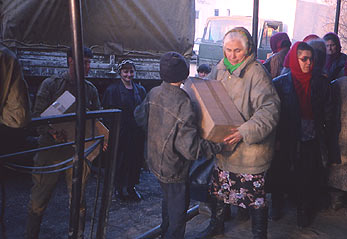Displaced Chechens anxious as troops move near Ingushetia camps, says UNHCR
Displaced Chechens anxious as troops move near Ingushetia camps, says UNHCR

NAZRAN, Ingushetia, November 1 (UNHCR) - The UN refugee agency has said that a recent military build-up near camps for internally displaced Chechens in Ingushetia is worrying inhabitants and raising protection concerns for some who have yet to receive official registration documents.
UNHCR staff and monitors have reported that since October 25, military troops have moved to Ingushetia and established a presence close to four camps for internally displaced persons (IDPs). The camps in central Ingushetia, known locally as Alina, Bella, Satitza and Sputnik, host some 17,000 Chechen IDPs.
The troops, which are reportedly there to prevent any attack from terrorist groups on the camps, have installed a few tents and trucks at the edge of the camps or, in the case of Bella camp, at the entrance. No military presence has been reported in any other camp or near temporary settlements.
A document check was put in place at the four camps as of Thursday, October 31. Soldiers have been checking all cars and persons entering or leaving, and only IDPs who have a registration document proving their official presence in the camps can move freely in and out.
UNHCR is concerned this could raise protection problems for some of the IDPs who have not received the necessary registration documents from the local authorities. The agency has urged the authorities to provide appropriate documentation to the displaced people as soon as possible.
The IDPs are also getting increasingly anxious about the presence of troops and arms so close to the camps. In at least one of the camps, the proximity of military tents to a school has caused attendance to drop by 70 percent.
Meanwhile, the international aid community continues to emphasise to the federal and local authorities the urgent need for winterisation of accommodation at the camps. This is especially pertinent given the affirmed position of the Federal and Ingushetia Migration Services that any return to Chechnya will be voluntary. As such, special arrangements will have to be made for those IDPs who choose to remain in Ingushetia - wanting neither to return to Chechnya nor to be relocated from tent camps to other buildings in Ingushetia.
For many of the IDPs, this will be their fourth winter in the camps. Some of their tents are in disrepair due to wear and tear over the years. So far, it has been agreed that tents in Alina and Sputnik camps will be replaced as necessary.
Since early September, the Migration Services have encouraged IDPs in Iman camp in Aki Yurt, northern Ingushetia, to relocate to the surroundings of the camp or to Karabulak, close to Sleptovskayia or in Nazran. After assessing the proposed relocation sites, UNHCR's technical team has found that they will require a considerable amount of work that will be difficult to complete before winter sets in.
In all, some 110,000 displaced Chechens are staying in Ingushetia, approximately 20,000 of them in tent camps.








